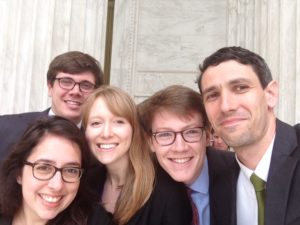SCOTUS Clinic Culminates Another Busy Year With a Landmark Victory

The Supreme Court Litigation Clinic had a busy and productive spring, culminating in late June with a landmark victory. With co-director Pam Karlan on leave at the Department of Justice, the clinic had the good fortune of teaming up with Don Ayer of Jones Day to teach the clinic with Professor Jeff Fisher. Under their joint supervision, the clinic drafted briefs in seven cases on behalf of criminal defendants and civil plaintiffs as follows: petitions for certiorari asking the Court to resolve (1) whether the Sixth Amendment’s Confrontation Clause applies at capital sentencing hearings and (2) whether the Fourth Amendment allows police officers to trespass in the common areas of locked apartment buildings without a warrant in order to look for evidence of crime; briefs in opposition to certiorari in cases involving (3) how the Fair Labor Standards Act’s minimum-wage rules apply to travel expenses incurred by immigrant farmworkers and (4) how the Confrontation Clause applies to statements teachers obtain from children alleging child abuse; and briefs on the merits arguing (5) that a police officer’s mistake of law cannot provide the individualized suspicion the Fourth Amendment requires to justify a traffic stop; and (6) that the Fourth Amendment does not allow officers, absent a warrant, to search the digital contents of cell phones seized incident to arrest. In its seventh case, the clinic drafted a letter brief to the Solicitor General in a case in which the Court invited that Office to express its views. The issue is whether the Foreign Sovereign Immunity Act allows a U.S. citizen who purchases a ticket for foreign travel on a state-owned carrier to sue the carrier in this country for a subsequent breach of the duty of safe passage, and the clinic followed up this summer with a meeting at the DOJ with top governmental personnel.
About that cell phone case, Riley v. California: the clinic achieved the rare feat of a unanimous victory on behalf of privacy rights, in an opinion that commentators are terming “sweeping,” “bold,” and even “revolutionary.” All the credit goes to the students, whose tireless work not only astutely educated the Justices about the realities of cell phone usage and data storage in the digital age, but also crafted an eloquent legal theory to match, centered around the theme that “digital is different.” As if to seal their moment in time, the students also took a “selfie” on the front steps of the Court after the oral argument – an image the Mills Legal Clinic will savor for years to come. ◊
